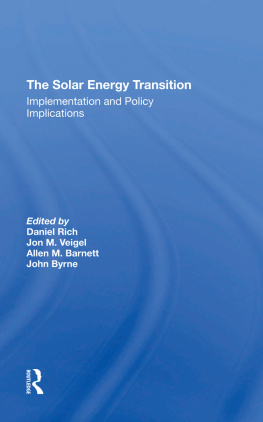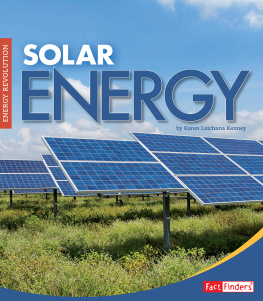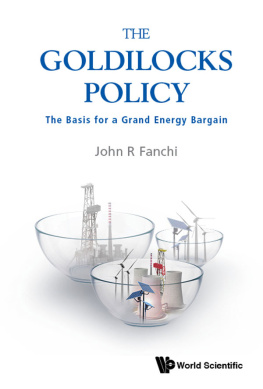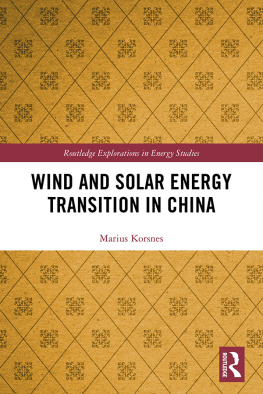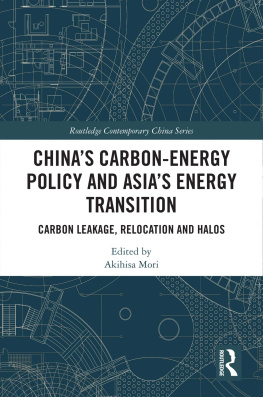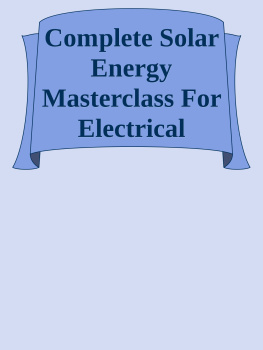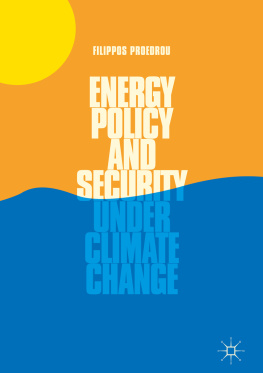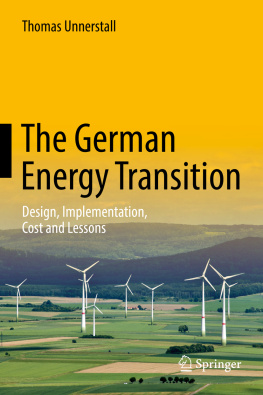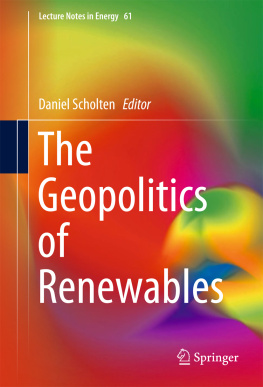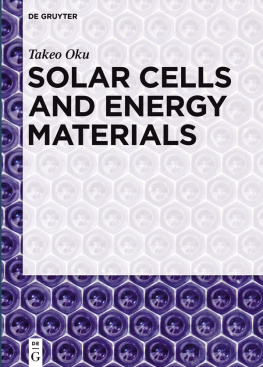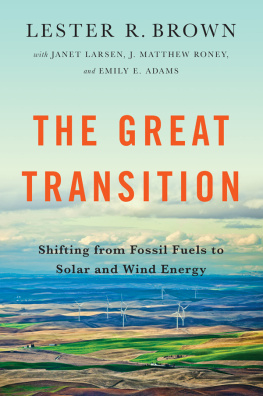The Solar Energy Tansition
Implementation and Policy implications
AAAS Selected Symposia Series
The Solar Energy Transition
Implementation and Policy Implications
Edited by Daniel Rich ,
Jon M. Veigel , Allen M. Barnett ,
and John Byrne
AAAS Selected Symposium 74
First published 1983 by Westview Press
Published 2018 by Routledge
52 Vanderbilt Avenue, New York, NY 10017
2 Park Square, Milton Park, Abingdon, Oxon OX14 4RN
Routledge is an imprint of the Taylor & Francis Group, an informa business
Copyright 1983 by the American Association for the Advancement of Science
All rights reserved. No part of this book may be reprinted or reproduced or utilised in any form or by any electronic, mechanical, or other means, now known or hereafter invented, including photocopying and recording, or in any information storage or retrieval system, without permission in writing from the publishers.
Notice:
Product or corporate names may be trademarks or registered trademarks, and are used only for identification and explanation without intent to infringe.
Library of Congress Catalog Card Number 83-60009
ISBN 13: 978-0-367-29588-2 (hbk)
About the Book
Solar energy is considered by many an attractive and practical option for America's energy future, one that is technically and commercially feasible as well as socially and environmentally desirable. Sun-generated power could meet upwards of 20 percent of U.S. energy needs by the year 2000but only if there is a concerted national effort to use this energy option. The issues of implementation and the public and private initiatives needed to facilitate a transition to extensive use of solar energy are the focus of this volume.
The solar transition is addressed from the diverse perspectives of the many necessary participants: industries and small businesses; local, state, regional, and federal governments; public utilities; policy analysts; and solar advocates. The contributors assess the extent to which solar alternatives can replace and augment other energy forms, the pace and pattern for solar commercialization, and the roles of public and private institutions in carrying out the transition. A consensus becomes apparent: Although the transition to solar energy is technically and commercially viable, its success depends on concerted public and private efforts to promote innovation and diversification in energy production and distribution and to institute major changes in public policy related to energy use.
About the Series
The AAAS Selected Symposia Series was begun in 1977 to provide a means for more permanently recording and more widely disseminating some of the valuable material which is discussed at the AAAS Annual National Meetings, The volumes in this Series are based on symposia held at the Meetings which address topics of current and continuing significance, both within and among the sciences, and in the areas in which science and technology impact on public policy. The Series format is designed to provide for rapid dissemination of information, so the papers are not typeset but are reproduced directly from the camera-copy submitted by the authors. The papers are organized and edited by the symposium arrangers who then become the editors of the various volumes. Most papers published in this Series are original contributions which have not been previously published, although in some cases additional papers from other sources have been added by an editor to provide a more comprehensive view of a particular topic. Symposia may be reports of new research or reviews of established work, particularly work of an interdisciplinary nature, since the AAAS Annual Meetings typically embrace the full range of the sciences and their societal implications.
WILLIAM D. CAREY
Executive Officer
American Association for
the Advancement of Science
Dedication
This work is dedicated to the memory of Chuckie Barnett who died unexpectedly on the first day of Spring in 1981, shortly before his sixth birthday. Chuckie was proud of his participation in many solar energy events, including his celebration of the first "Sun Day." If the patience, persistence, and sense of humor he exhibited in the face of daily obstacles are characteristic of his generation, then we can only be optimistic about the future.
Daniel Rich is professor in the College of Urban Affairs and Public Policy at the University of Delaware, Newark; in 1980-81 he served as director of that university's Energy Policy Research Group. In 1977 he served as codirector of the MIT Project on National Energy Conservation Strategies. His research includes analyses of residential energy conservation, utility rate -policy, and the role of consumer energy information in household conservation. He is coauthor of Strategic Alternatives for Energy Conservation (with J. Utterback and M. Sirbu; MIT Center for Policy Alternatives, 1977) and has published books and articles in the areas of energy policy, futures studies, and urban governance.
Jon M. Veigel is executive director of the Alternative Energy Corporation in Research Triangle Park, North Carolina. The corporation was established, by the state Utilities Commission to moderate growth in demand of electricity by encouraging energy efficiency and use of alternative technologies. He has been involved in energy policy in general and the development of alternative energy technologies in particular for several years. As a former manager of the Planning, Applications, and Impacts division at the Solar Energy Research Institute, he worked to identify and overcome the social , environmental, and technological barriers preventing widespread adoption of solar energy systems.
Allen M. Barnett , currently professor of electrical engineering at the University of Delaware, Newark, has extensive experience in all phases of product development, from laboratory concept to marketing strategies. He spent six years at General Electric Company, where he managed the Light Emitting Diode Array Program, and in 1971 he founded XCITON corporation to develop and manufacture semiconductor opto-electronics products. From 1976 to 1979 he served as director of the University of Delaware's Institute of Energy Conversion, overseeing projects aimed at developing energy conservation and solar energy. He has worked with a number of major corporations in planning commercialization strategies of new technologies.
John Byrne is director of the Energy Policy Research Group and assistant professor in the College of Urban Affairs and Public Policy and in the Center for the Study of Values at the University of Delaware, Newark. His research includes analyses of the role of prices in energy conservation, utility rate and load control policy, the role of information in household conservation, and the utility of aggregate energy demand models. He has published articles and books on energy policy, cost-benefit analysis, futures studies, and corrections policy.
Wilson Clark , president of Control Energy Corporatton in Washington, D.C., manages programs in energy management and international development. A specialist in alternative energy technologies and conservation programs, he has served as Chief Energy Advisor to the Governor of California, where he initiated development of the Salton Sea Solar Pond Power Project, and as energy consultant to the Beijing Economic development Commission (People's Republic of China), Be is the author of several books on energy and technology, among them Energy, Vulnerability and War (with J. Page; Norton, 1981) and Energy Technology and Agriculture (Doubleday/Anchor Press, in press).


